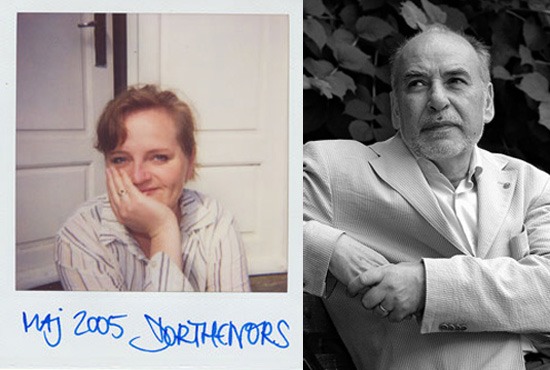About a week ago, The New Yorker delighted droves of readers by opening a great deal of its archives to inaugurate its website redesign. But a summer spent sifting through thousands of back articles, essays, fiction, and poems sounds nice only until you realize time is limited. Not to worry: Eva and Patty, brave Asymptote blog editors, have combed the magazine’s darkest depths to select some of The New Yorker’s best pieces—in translation.
“By Fire” (from French), Tahar Ben Jelloun, translated by Rita S. Nezami
Maybe you haven’t heard of Moroccan author Tahar Ben Jelloun—but this remarkable short story, influenced by real-life events (with real-life consequences), should cause you to take note. Inspired by Mohamed Bouazizi, the Tunisian man whose 2010 death helped launch the Arab Spring, “By Fire” is impressive in its simplicity and scope, somehow managing to capture a very specific set of circumstances with a delicacy so profound and a resonance that is all-too-human. The piece’s terrible (and impressive) conclusion is painful to read, astoundingly closing up a tightly controlled story without resorting to gimmickry, melodrama, or heavyhandedness, despite the implication of its subject matter. Tahar Ben Jelloun manages to capture the human spirit’s conflict between quotidian trials and existential despair.
“The Heron” (from Danish), Dorthe Nors, translated by Martin Aitken
“Things are contagious. Things want to get in through the cracks,” explains the unhinged, detail-oriented narrator of this unusual short story from Danish author Dorthe Nors. The speaker’s voice is fresh and a little disturbing, and as he meditates on the disease-carrying herons of Frederiksberg Gardens, his memories and sometimes violent fantasies impinge on his outwardly calm walk through the park. Throughout the story, Nors brilliantly explores a theme of contagion, deftly moving from a description of infectious herons to the communal ramifications of a nearby murder. The author of five novels, Nors recently saw her first book published in English; Karate Chop, a collection of short stories, is out now from Graywolf Press. (Keep your eyes peeled for a review coming soon to Asymptote blog!)
“The Stolen Pigeons” (from French), Marguerite Duras, translated by Deborah Treisman
French writer and filmmaker Marguerite Duras is known to visit her adolescence in much of her writing, as she did in her superstar-of-the-French-college-seminar novel, The Lover, but the subject of “The Stolen Pigeons” is quite old: told from a child’s perspective, the story focuses on a terrifying and fascinating old woman whose relationship with her younger daughter-in-law—and the old woman’s ensuing antics—inspire both fear and wonder in the story’s protagonist. What results is a charming short story reflective of the peculiar wisdom and sadness of old age.
“So It Is In Life” (from Russian), Daniil Kharms, translated by Matvei Yankelevich, with Simona Schneider and Eugene Ostashevsky
Critical comparisons have been drawn to Beckett, Camus, and Ionesco, The New Yorker tells us of Russian writer Daniil Kharms, but perhaps a closer fit to Kharms’s extravagance, absurdity, and humor would be Robert Walser. Either way, these short, perfect texts treat narrative logic with wonderful disdain: characters walk down the street with their hands covering their eyes, they spend prodigious amounts of time switching between pieces of furniture, and they obsess about the men in their stoves. In his lifetime, Kharms was known as a children’s writer and as one of the founders of an avant garde Futurist group of artists and writers; following his incarceration in 1941 by the N.K.V.D., he died in a prison hospital during the siege of Leningrad, his “adult” works almost entirely unpublished. Thankfully, that’s changed.
“Samsa in Love” (from Japanese), Haruki Murakami, translated by Ted Goossen
Ask any American what contemporary translated literature he or she has been reading and the response is likely Japanese perennial Nobel-favorite Haruki Murakami. Murakami’s surrealist oeuvre is well-known and his preoccupation with themes of isolation and alienation take heavy cues from Franz Kafka—but he’s not afraid to acknowledge this inspiration, identifying his influence by name in his 2005 novel Kafka on the Shore and again riffing on The Metamorphosis in this short-and-sweet rendition of Kafka’s memorable novella. In this version, the protagonist awakes to discover that he (or it?) has “undergone a metamorphosis and become Gregor Samsa”—a man who has no idea who he is or what he has ever been besides Samsa. Just like in Kafka’s tale, issues of loneliness and self-estrangement guide this tale. But as betrayed by the title, Samsa steps out of his tiny room and stumbles through the confusion of what’s outside.
“Clara” (from Spanish), Roberto Bolaño, translated by Chris Andrews
Roberto Bolaño’s story takes as its focal point the life of a woman named Clara; and not just a small part of her life, but her whole life, and explained not from the point of view of someone who was there through it all, but from an ex-boyfriend’s perspective—a near stranger. Perhaps because of these many degrees of distance, of separation, Clara’s life appears horribly sad. The narrator has affected almost nothing in Clara’s life, nor has she affected anything in his; and although it is not told in a journalistic style, there is some powerful reportage quality about the piece and about the muted way Clara’s personality and neuroses are evoked and her major life events are told. Chris Andrews, a frequent translator of Bolaño and César Aira, offers a wonderful translation not to be missed.
***
And of course, we’re delighted to mention some of the The New Yorker’s best pieces, translated by superstars on the Asymptote team: be sure to read former Asymptote assistant managing editor Megan McDowell’s translation from the Spanish of Alejandro Zambra’s “Camilo” and contributing editor Howard Goldblatt’s translation from the Chinese of Mo Yan’s “Bull.” And before you’ve left The New Yorker, exhausted by so much reading (!), do head over to Etgar Keret’s recent piece, “Israel’s Other War,” translated by Yardenne Greenspan, editor-at-large for Israel, in which Keret discusses the efforts within Israel to quiet criticism of the country’s actions.

